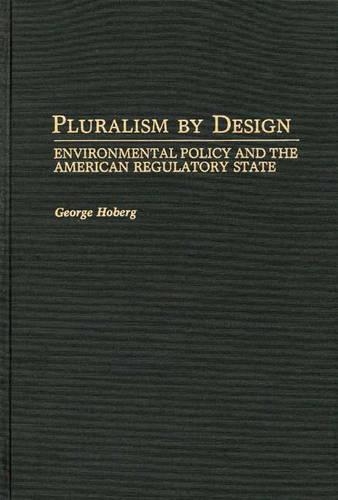
Pluralism By Design: Environmental Policy and the American Regulatory State
(Hardback)
Publishing Details
Pluralism By Design: Environmental Policy and the American Regulatory State
By (Author) George Hoberg
Bloomsbury Publishing PLC
Praeger Publishers Inc
19th March 1992
United States
Classifications
Tertiary Education
Non Fiction
Regional, state and other local government
320.80973
Physical Properties
Hardback
256
Description
Vast changes in U.S. environmental policy from the New Deal through the Reagan administration have occurred that shed light on the nature of the American regulatory state. This book focuses on the sweeping transformation of regulatory policymaking that took place around 1970. The rise of social regulation and the advent of public interest movement during the 1960s and 1970s led to a significant change in policy outcomes, as the influence of governmental actors and political activists increased at the expense of business. By homing in on two specific areas, pesticide regulation and air pollution control, this study attempts to describe and explain these changes. This book is distinguished by its explanation of the transformation to the new system, its understanding of the way the new regulatory arrangements affect policy outcomes, and, most important, its explicit consideration of recent controversies in empirical political theory. The results provide an assessment of both the strengths and the weaknesses of the new institutionalism as a theoretical approach to studying domestic public policy in the United States. The regime framework developed here is designed to emphasize the multiplicity of forces behind public policy. This volume will be of interest to students of the American policy process, environmental policy and regulation, and theories of the American state, in academia, government, and the environmental policy community.
Reviews
It is a worthy addition to the growing number of longitudinal studies now emerging in environmental policy studies, and an important one because it helps to put environmental regulation into its proper institutional contexts. It also is well written. I recommend it strongly for graduate students in history, political science, and environmental studies programs, although it certainly is accessible for upper-level undergraduates as well.-Environmental History Review
"It is a worthy addition to the growing number of longitudinal studies now emerging in environmental policy studies, and an important one because it helps to put environmental regulation into its proper institutional contexts. It also is well written. I recommend it strongly for graduate students in history, political science, and environmental studies programs, although it certainly is accessible for upper-level undergraduates as well."-Environmental History Review
Author Bio
GEORGE HOBERG is an Assistant Professor at the University of British Columbia. / He is the author of numerous articles on American and comparative environmental policy.
